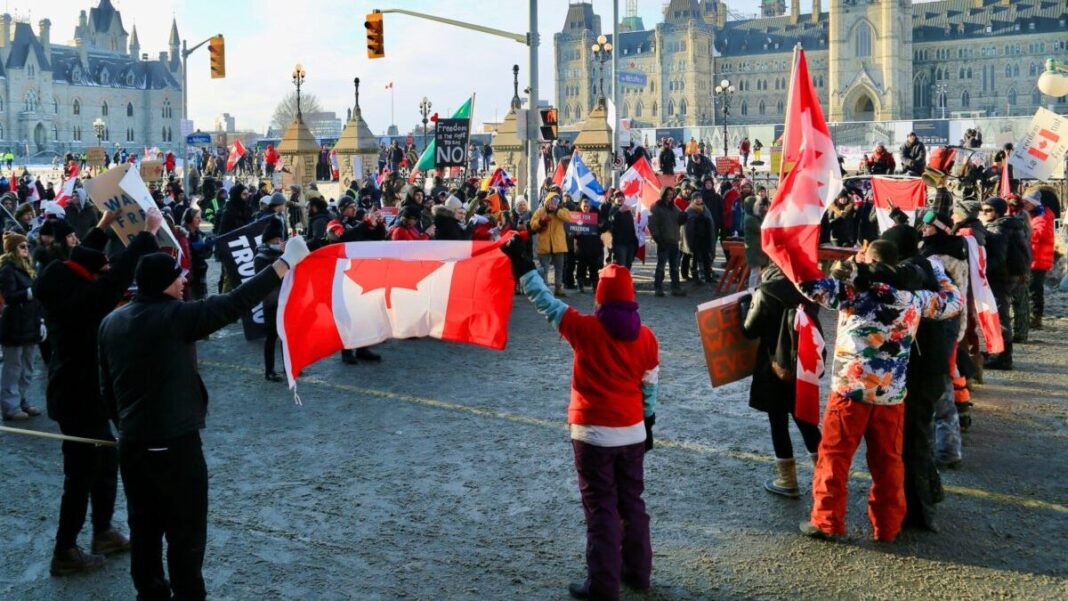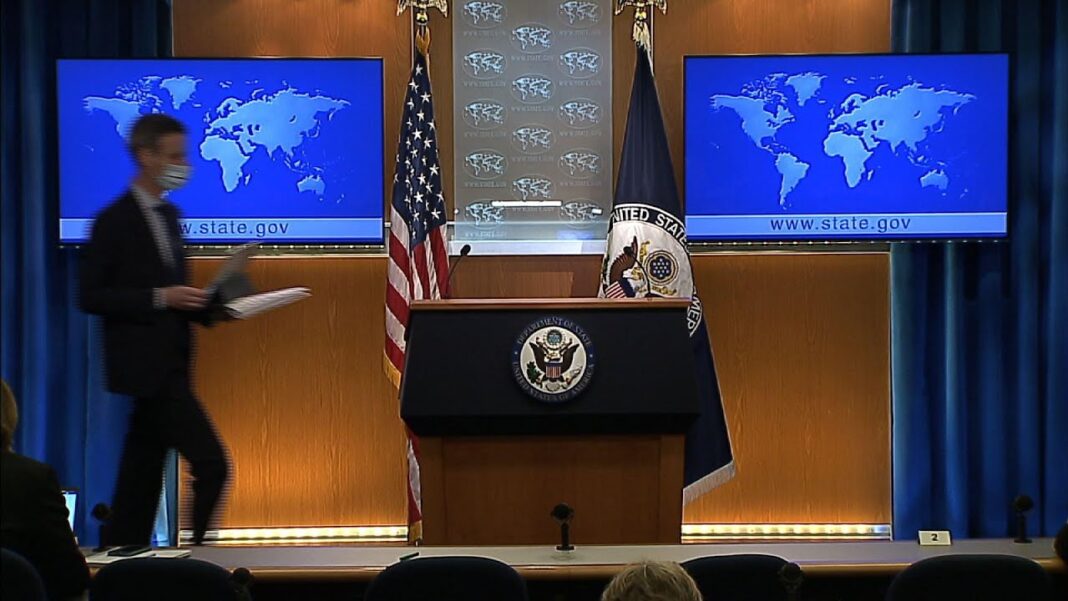At the invitation of President of the People’s Republic of China Xi Jinping, President of the Russian Federation Vladimir V. Putin visited China on 4 February 2022. The Heads of State held talks in Beijing and took part in the opening ceremony of the XXIV Olympic Winter Games.
The Russian Federation and the People’s Republic of China, hereinafter referred to as the sides, state as follows.
Today, the world is going through momentous changes, and humanity is entering a new era of rapid development and profound transformation. It sees the development of such processes and phenomena as multipolarity, economic globalization, the advent of information society, cultural diversity, transformation of the global governance architecture and world order; there is increasing interrelation and interdependence between the States; a trend has emerged towards redistribution of power in the world; and the international community is showing a growing demand for the leadership aiming at peaceful and gradual development. At the same time, as the pandemic of the new coronavirus infection continues, the international and regional security situation is complicating and the number of global challenges and threats is growing from day to day. Some actors representing but the minority on the international scale continue to advocate unilateral approaches to addressing international issues and resort to force; they interfere in the internal affairs of other states, infringing their legitimate rights and interests, and incite contradictions, differences and confrontation, thus hampering the development and progress of mankind, against the opposition from the international community.
The sides call on all States to pursue well-being for all and, with these ends, to build dialogue and mutual trust, strengthen mutual understanding, champion such universal human values as peace, development, equality, justice, democracy and freedom, respect the rights of peoples to independently determine the development paths of their countries and the sovereignty and the security and development interests of States, to protect the United Nations-driven international architecture and the international law-based world order, seek genuine multipolarity with the United Nations and its Security Council playing a central and coordinating role, promote more democratic international relations, and ensure peace, stability and sustainable development across the world.
I
The sides share the understanding that democracy is a universal human value, rather than a privilege of a limited number of States, and that its promotion and protection is a common responsibility of the entire world community.
The sides believe that democracy is a means of citizens’ participation in the government of their country with the view to improving the well-being of population and implementing the principle of popular government. Democracy is exercised in all spheres of public life as part of a nation-wide process and reflects the interests of all the people, its will, guarantees its rights, meets its needs and protects its interests. There is no one-size-fits-all template to guide countries in establishing democracy. A nation can choose such forms and methods of implementing democracy that would best suit its particular state, based on its social and political system, its historical background, traditions and unique cultural characteristics. It is only up to the people of the country to decide whether their State is a democratic one.
The sides note that Russia and China as world powers with rich cultural and historical heritage have long-standing traditions of democracy, which rely on thousand-years of experience of development, broad popular support and consideration of the needs and interests of citizens. Russia and China guarantee their people the right to take part through various means and in various forms in the administration of the State and public life in accordance with the law. The people of both countries are certain of the way they have chosen and respect the democratic systems and traditions of other States.
The sides note that democratic principles are implemented at the global level, as well as in administration of State. Certain States’ attempts to impose their own ”democratic standards“ on other countries, to monopolize the right to assess the level of compliance with democratic criteria, to draw dividing lines based on the grounds of ideology, including by establishing exclusive blocs and alliances of convenience, prove to be nothing but flouting of democracy and go against the spirit and true values of democracy. Such attempts at hegemony pose serious threats to global and regional peace and stability and undermine the stability of the world order.
The sides believe that the advocacy of democracy and human rights must not be used to put pressure on other countries. They oppose the abuse of democratic values and interference in the internal affairs of sovereign states under the pretext of protecting democracy and human rights, and any attempts to incite divisions and confrontation in the world. The sides call on the international community to respect cultural and civilizational diversity and the rights of peoples of different countries to self-determination. They stand ready to work together with all the interested partners to promote genuine democracy.
The sides note that the Charter of the United Nations and the Universal Declaration of Human Rights set noble goals in the area of universal human rights, set forth fundamental principles, which all the States must comply with and observe in deeds. At the same time, as every nation has its own unique national features, history, culture, social system and level of social and economic development, universal nature of human rights should be seen through the prism of the real situation in every particular country, and human rights should be protected in accordance with the specific situation in each country and the needs of its population. Promotion and protection of human rights is a shared responsibility of the international community. The states should equally prioritize all categories of human rights and promote them in a systemic manner. The international human rights cooperation should be carried out as a dialogue between the equals involving all countries. All States must have equal access to the right to development. Interaction and cooperation on human rights matters should be based on the principle of equality of all countries and mutual respect for the sake of strengthening the international human rights architecture.
II
The sides believe that peace, development and cooperation lie at the core of the modern international system. Development is a key driver in ensuring the prosperity of the nations. The ongoing pandemic of the new coronavirus infection poses a serious challenge to the fulfilment of the UN 2030 Agenda for Sustainable Development. It is vital to enhance partnership relations for the sake of global development and make sure that the new stage of global development is defined by balance, harmony and inclusiveness.
The sides are seeking to advance their work to link the development plans for the Eurasian Economic Union and the Belt and Road Initiative with a view to intensifying practical cooperation between the EAEU and China in various areas and promoting greater interconnectedness between the Asia Pacific and Eurasian regions. The sides reaffirm their focus on building the Greater Eurasian Partnership in parallel and in coordination with the Belt and Road construction to foster the development of regional associations as well as bilateral and multilateral integration processes for the benefit of the peoples on the Eurasian continent.
The sides agreed to continue consistently intensifying practical cooperation for the sustainable development of the Arctic.
The sides will strengthen cooperation within multilateral mechanisms, including the United Nations, and encourage the international community to prioritize development issues in the global macro-policy coordination. They call on the developed countries to implement in good faith their formal commitments on development assistance, provide more resources to developing countries, address the uneven development of States, work to offset such imbalances within States, and advance global and international development cooperation. The Russian side confirms its readiness to continue working on the China-proposed Global Development Initiative, including participation in the activities of the Group of Friends of the Global Development Initiative under the UN auspices. In order to accelerate the implementation of the UN 2030 Agenda for Sustainable Development, the sides call on the international community to take practical steps in key areas of cooperation such as poverty reduction, food security, vaccines and epidemics control, financing for development, climate change, sustainable development, including green development, industrialization, digital economy, and infrastructure connectivity.
The sides call on the international community to create open, equal, fair and non-discriminatory conditions for scientific and technological development, to step up practical implementation of scientific and technological advances in order to identify new drivers of economic growth.
The sides call upon all countries to strengthen cooperation in sustainable transport, actively build contacts and share knowledge in the construction of transport facilities, including smart transport and sustainable transport, development and use of Arctic routes, as well as to develop other areas to support global post-epidemic recovery.
The sides are taking serious action and making an important contribution to the fight against climate change. Jointly celebrating the 30th anniversary of the adoption of the UN Framework Convention on Climate Change, they reaffirm their commitment to this Convention as well as to the goals, principles and provisions of the Paris Agreement, including the principle of common but differentiated responsibilities. The sides work together to ensure the full and effective implementation of the Paris Agreement, remain committed to fulfilling the obligations they have undertaken and expect that developed countries will actually ensure the annual provision of $100 billion of climate finance to developing states. The sides oppose setting up new barriers in international trade under the pretext of fighting climate change.
The sides strongly support the development of international cooperation and exchanges in the field of biological diversity, actively participating in the relevant global governance process, and intend to jointly promote the harmonious development of humankind and nature as well as green transformation to ensure sustainable global development.
The Heads of State positively assess the effective interaction between Russia and China in the bilateral and multilateral formats focusing on the fight against the COVID-19 pandemic, protection of life and health of the population of the two countries and the peoples of the world. They will further increase cooperation in the development and manufacture of vaccines against the new coronavirus infection, as well as medical drugs for its treatment, and enhance collaboration in public health and modern medicine. The sides plan to strengthen coordination on epidemiological measures to ensure strong protection of health, safety and order in contacts between citizens of the two countries. The sides have commended the work of the competent authorities and regions of the two countries on implementing quarantine measures in the border areas and ensuring the stable operation of the border crossing points, and intend to consider establishing a joint mechanism for epidemic control and prevention in the border areas to jointly plan anti-epidemic measures to be taken at the border checkpoints, share information, build infrastructure and improve the efficiency of customs clearance of goods.
The sides emphasize that ascertaining the origin of the new coronavirus infection is a matter of science. Research on this topic must be based on global knowledge, and that requires cooperation among scientists from all over the world. The sides oppose politicization of this issue. The Russian side welcomes the work carried out jointly by China and WHO to identify the source of the new coronavirus infection and supports the China – WHO joint report on the matter. The sides call on the global community to jointly promote a serious scientific approach to the study of the coronavirus origin.
Signatory: Russia
Signing Date: 02-04-2022
The place of signing: Beijing






